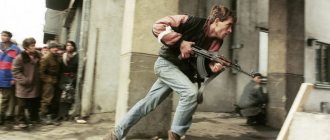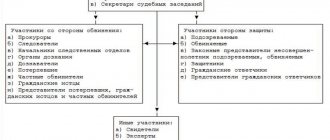The composition of the court when considering materials from legal cases varies. A certain number of judges are appointed for each trial.
A judge is a subject endowed with judicial power who administers justice. They take a judicial oath. In Russia, legal and civil procedural legislation (CCP) requires everyone involved in the process to address the court as “respected court.” The Criminal Procedure Code (Article 257, paragraph 3) additionally states that citizens should address judges as “Your Honor.”
Multi-channel free hotline Legal advice on criminal law. Every day from 9.00 to 21.00
Moscow and region: +7 (495) 662-44-36
St. Petersburg: +7 (812) 449-43-40
Article 30 of the Code of Criminal Procedure of the Russian Federation
Legal cases are considered by the court collectively or by one judge. The legal composition of the court in criminal proceedings is created based on the workload and judicial training of the servants of Themis.
The status of the chairman of the court implies the ability to make organizational and personnel decisions. He appoints and dismisses judicial employees, conducts inspections, manages legal proceedings and takes part in the proceedings. The deputy head of the court has functions related to the performance of the duties of a judge and the execution of special assignments of the head of the court.
The following specialists work in the court apparatus:
- Assistant to the Chairman.
- Assistant Judge.
- Court administrator.
- Consultant.
- Chief Specialist.
- Specialist category I.
- Specialist of category II.
- Specialist.
All employees of the apparatus with diplomas, titles and ranks according to the classification and tests passed.
The court of first instance examines legal materials:
- federal general judge. It considers all offenses, appeal materials, in addition to those noted in paragraph 2 of paragraph 4 of the current Article 30 of the Code of Criminal Procedure of the Russian Federation;
- federal judge and 12 jurors. The accused can file a motion to have his case heard under this scheme. Jury proceedings operate throughout the Russian Federation, except for the Crimean Republic and Sevastopol; in these territories, jury trials should begin in January 2018;
- a collegial court case at first instance can be considered by a panel of three judicial representatives;
- magistrate, whose principle of work is to examine criminal materials under Art. 31 part 1 of the current Code.
The panel, which includes three judges of the federal judicial body of general jurisdiction, has the right to deal with especially serious offenses, cases of terrorism against public and intellectual security. This panel also considers legal cases of cassation and appeal of supervisory cases.
Military courts do not have magistrate justice bodies, which is why offenses committed within the jurisdiction of the magistrate’s court by civilians or military personnel undergoing military training will be considered by the garrison military court.
Judicial power in our country is invariably exercised through judges, but there are situations when an application for the recusal of a judge is possible, after which a change in the composition of the judges will occur.
Composition of the court when considering criminal cases
According to Art. 4 of the Federal Constitutional Law of December 31, 1996 No. 1-FKZ (as amended on October 30, 2018) “On the Judicial System of the Russian Federation” [7] justice in the Russian Federation is carried out only by courts established in accordance with the Constitution of the Russian Federation and the specified FKZ. The creation of emergency courts and courts not provided for by this law is not permitted.
In the Russian Federation there are federal courts, constitutional (statutory) courts and magistrates of the constituent entities of the Russian Federation, which make up the judicial system of the Russian Federation.
The federal courts that administer justice in criminal cases include:
— Supreme Court of the Russian Federation;
— cassation courts of general jurisdiction;
— courts of appeal of general jurisdiction;
— supreme courts of the republics, regional, regional courts, courts of federal cities, courts of the autonomous region and autonomous districts (regional courts);
— district courts (district level courts);
- military courts that make up the system of federal courts of general jurisdiction.
Magistrates, being judges of general jurisdiction of the constituent entities of the Russian Federation, also administer justice in criminal cases.
According to the Criminal Procedure Code of the Russian Federation, justice in criminal cases is carried out by a collegial court or a single judge. The composition of the court for consideration of a particular case is formed taking into account the workload and specialization of judges in a manner that excludes influence on its formation by persons interested in the outcome of the trial, including using an automated information system. If it is impossible to use an automated information system in court, it is allowed to form the composition of the court in a different manner, excluding influence on its formation by persons interested in the outcome of the trial (Part 1 of Article 30 of the Code of Criminal Procedure).
For collegial consideration of cases at first instance, representatives of the public may sometimes be involved as jurors. A judge, as a bearer of judicial power, acts as an official of the judicial system, performing his duties on a professional basis and appointed in compliance with the requirements established by the Constitution of the Russian Federation and the Federal Constitutional Law “On the Judicial System of the Russian Federation”.
The current criminal procedural legislation gives priority in the administration of justice in the court of first instance to a single judge
, abolishing the institution of people's assessors, which operated until the restoration of the jury trial in the Criminal Procedure Code of the RSFSR in the early 90s of the last century.
Yes, magistrate
considers on the merits criminal cases within its competence in accordance with Part 1 of Art. 31 Code of Criminal Procedure. As a rule, its jurisdiction includes crimes of minor and medium gravity, for the commission of which a punishment of imprisonment for a term of no more than three years can be imposed, with the exception of a number of crimes listed in this article, as well as criminal cases of private prosecution.
Federal judge
courts of general jurisdiction resolve all criminal cases
individually
, with the exception of criminal cases under the jurisdiction of a magistrate.
Some criminal cases involving grave and especially grave crimes specified in the law can be considered by a judge of a federal court of general jurisdiction and a panel of eight (in a regional court and an equivalent military court) or six (in a district court and an equivalent military court) jurors or a panel of three judges of a federal court of general jurisdiction in the presence of a request from the accused, submitted before the appointment of a court hearing (clauses 2-4, part 2, article 30 of the Code of Criminal Procedure).
Also alone
Criminal cases are considered on appeal by a federal judge of the district court on appeals and submissions against decisions of the magistrate.
In higher courts - by a court composed of three judges
federal court of general jurisdiction, with the exception of criminal cases of crimes of minor and medium gravity, as well as criminal cases with appeals and submissions to interim decisions of a district court, garrison military court, which are considered by a judge of a regional court and an equivalent military court
alone.
Consideration of criminal cases in cassation is carried out by the judicial collegium for criminal cases of the cassation court of general jurisdiction, the military court of cassation, the Judicial collegium for criminal cases of the Supreme Court of the Russian Federation and the Judicial collegium for military personnel of the Supreme Court of the Russian Federation, consisting of three judges
, and by way of supervision -
by the majority of
members of the Presidium of the Supreme Court of the Russian Federation.
The law establishes that when a criminal case is considered by a court consisting of three judges of a federal court of general jurisdiction, one of them presides over the court hearing.
Some features are established by the Code of Criminal Procedure of the Russian Federation for the sole consideration of cases within the competence of justices of the peace by military judges. Criminal cases of crimes committed by military personnel and citizens undergoing military training, under the jurisdiction of magistrates, are considered individually
judges of garrison military courts in the manner established for justices of the peace Ch. 41 Code of Criminal Procedure. In these cases, the judge's verdict and decision can be appealed to a higher military court on appeal (Part 6 of Article 30 of the Code of Criminal Procedure).
According to Art. 4 of the Federal Constitutional Law of December 31, 1996 No. 1-FKZ (as amended on October 30, 2018) “On the Judicial System of the Russian Federation” [7] justice in the Russian Federation is carried out only by courts established in accordance with the Constitution of the Russian Federation and the specified FKZ. The creation of emergency courts and courts not provided for by this law is not permitted.
In the Russian Federation there are federal courts, constitutional (statutory) courts and magistrates of the constituent entities of the Russian Federation, which make up the judicial system of the Russian Federation.
The federal courts that administer justice in criminal cases include:
— Supreme Court of the Russian Federation;
— cassation courts of general jurisdiction;
— courts of appeal of general jurisdiction;
— supreme courts of the republics, regional, regional courts, courts of federal cities, courts of the autonomous region and autonomous districts (regional courts);
— district courts (district level courts);
- military courts that make up the system of federal courts of general jurisdiction.
Magistrates, being judges of general jurisdiction of the constituent entities of the Russian Federation, also administer justice in criminal cases.
According to the Criminal Procedure Code of the Russian Federation, justice in criminal cases is carried out by a collegial court or a single judge. The composition of the court for consideration of a particular case is formed taking into account the workload and specialization of judges in a manner that excludes influence on its formation by persons interested in the outcome of the trial, including using an automated information system. If it is impossible to use an automated information system in court, it is allowed to form the composition of the court in a different manner, excluding influence on its formation by persons interested in the outcome of the trial (Part 1 of Article 30 of the Code of Criminal Procedure).
For collegial consideration of cases at first instance, representatives of the public may sometimes be involved as jurors. A judge, as a bearer of judicial power, acts as an official of the judicial system, performing his duties on a professional basis and appointed in compliance with the requirements established by the Constitution of the Russian Federation and the Federal Constitutional Law “On the Judicial System of the Russian Federation”.
The current criminal procedural legislation gives priority in the administration of justice in the court of first instance to a single judge
, abolishing the institution of people's assessors, which operated until the restoration of the jury trial in the Criminal Procedure Code of the RSFSR in the early 90s of the last century.
Yes, magistrate
considers on the merits criminal cases within its competence in accordance with Part 1 of Art. 31 Code of Criminal Procedure. As a rule, its jurisdiction includes crimes of minor and medium gravity, for the commission of which a punishment of imprisonment for a term of no more than three years can be imposed, with the exception of a number of crimes listed in this article, as well as criminal cases of private prosecution.
Federal judge
courts of general jurisdiction resolve all criminal cases
individually
, with the exception of criminal cases under the jurisdiction of a magistrate.
Some criminal cases involving grave and especially grave crimes specified in the law can be considered by a judge of a federal court of general jurisdiction and a panel of eight (in a regional court and an equivalent military court) or six (in a district court and an equivalent military court) jurors or a panel of three judges of a federal court of general jurisdiction in the presence of a request from the accused, submitted before the appointment of a court hearing (clauses 2-4, part 2, article 30 of the Code of Criminal Procedure).
Also alone
Criminal cases are considered on appeal by a federal judge of the district court on appeals and submissions against decisions of the magistrate.
In higher courts - by a court composed of three judges
federal court of general jurisdiction, with the exception of criminal cases of crimes of minor and medium gravity, as well as criminal cases with appeals and submissions to interim decisions of a district court, garrison military court, which are considered by a judge of a regional court and an equivalent military court
alone.
Consideration of criminal cases in cassation is carried out by the judicial collegium for criminal cases of the cassation court of general jurisdiction, the military court of cassation, the Judicial collegium for criminal cases of the Supreme Court of the Russian Federation and the Judicial collegium for military personnel of the Supreme Court of the Russian Federation, consisting of three judges
, and by way of supervision -
by the majority of
members of the Presidium of the Supreme Court of the Russian Federation.
The law establishes that when a criminal case is considered by a court consisting of three judges of a federal court of general jurisdiction, one of them presides over the court hearing.
Some features are established by the Code of Criminal Procedure of the Russian Federation for the sole consideration of cases within the competence of justices of the peace by military judges. Criminal cases of crimes committed by military personnel and citizens undergoing military training, under the jurisdiction of magistrates, are considered individually
judges of garrison military courts in the manner established for justices of the peace Ch. 41 Code of Criminal Procedure. In these cases, the judge's verdict and decision can be appealed to a higher military court on appeal (Part 6 of Article 30 of the Code of Criminal Procedure).
Commentary to Art. 30 Code of Criminal Procedure of the Russian Federation
The new brief version of the commented article sets out and indicates the lack of uniformity in determining the number of those included in the court composition of the second instance.
The analysis of cassation materials is carried out by three judges. The appeal is conducted by one federal representative of the district court. The review of legal material of a supervisory nature is carried out by three federal representatives of the court.
Legal proceedings are carried out:
- Federal court representative.
- Collegially by three judges.
- Judge and 12 jurors.
- Justice of the peace.
In most cases, the composition of the court in criminal proceedings consists of one judge. When a case is heard by one judge, the process receives a more subjective assessment, which has a positive aspect.
The final verdict is made by one person - a federal judge, which is why all the strength of conviction, the eloquence of the accused, and the presentation of evidentiary documentation by his lawyer, is directed towards a specific person.
When a citizen is against having his material examined by one representative of Themis, he writes a petition about this. After this, the trial will be carried out jointly by three judges or considered by 12 jurors.
Three judges consider materials under clause 3, part 2, article 30 of the Code of Criminal Procedure of the Russian Federation and on the basis of a petition from the perpetrator. It is served:
- after reading the charges;
- at the stage of preliminary hearing in court;
- before setting a trial date.
When a defendant does not request that his legal papers be heard by three judges, it will be heard by one judge. The board deals with serious and especially grave legal offenses, for which sentences of more than 5 years in custody are imposed.
It is believed that three representatives of the court will be more competent in the analysis of legal materials, and then the permissibility of judicial errors is reduced to almost zero. When there are sufficient proof of guilt, it is extremely difficult to obtain relief from three judicial representatives.
When a federal judge and 12 jurors are included in a criminal trial, it is a jury trial. They have the authority to analyze the legal materials listed in clause 1, part 3 of Art. 31 Code of Criminal Procedure (Part 5 of Article 131, Part 5 of Article 132, Part 6 of Article 134, Part 1 of Article 212, Articles 275, 276, 278, 279, 281 of the Criminal Code of the Russian Federation are excluded). These are offenses with the most severe penalties, such as life imprisonment or the death penalty. Legal violations related to the economy are not included in this list.
In order for the case to be heard by a jury, the defendant files a petition for this, but for this the preliminary investigation must be completed. The advantage of such proceedings is that jury trials are considered democratic and objective due to the approach to resolving the issue from a human perspective. The disadvantage may be the complexity of trials of offenses by juries who do not know the intricacies of the criminal code. What composition of the court considers criminal cases on appeal? The trial takes place both individually and collectively.
Jurors are ordinary citizens who have difficulty understanding legal issues due to a lack of legal knowledge. Because of this, sometimes juries announce a more severe punishment than what the defendants deserve.
The magistrate examines the materials noted in Part 1 of Art. 31 of the Code of Criminal Procedure of the Russian Federation, according to which a maximum penalty is prescribed, not exceeding 3 years of imprisonment. This includes:
- Fraud.
- Mastery, waste.
- Use of force to conclude transactions, refusal of them.
- Illegal use of a product brand.
- Environmental violations.
It’s not news to anyone when the accused, by coincidence, finds himself under suspicion from the investigative authorities and tries to prove his innocence on his own, but this doesn’t help much.
In such cases, the assistance of an experienced lawyer is required, who within a few hours or days will release the person on his own recognizance and will not allow the extension of the detention period, and then, if necessary, will represent the interests of the accused in court.
Courts of appeal
The courts of appeal act as:
- district (city) courts - for decisions made by justices of the peace;
- judicial panels for criminal cases of regional (territorial) courts - for all decisions of district courts and interim decisions of regional (territorial) courts;
- Judicial Collegium for Criminal Cases of the Supreme Court of the Russian Federation On this topic, we have already completed course work
Proceedings in administrative cases considered by the Disciplinary Collegium of the Supreme Court of the Russian Federation in more detail - for final decisions of regional (territorial) courts; - Appeal Board of the Supreme Court of the Russian Federation On this topic, we have already completed an abstract
The Supreme Court of the Russian Federation and the system of courts of general jurisdiction in more detail - for decisions of judges of the Supreme Court of the Russian Federation On this topic, we have already completed
an abstract
of the Supreme Court of the Russian Federation in more detail.
Arbitrage practice
The courts carry out a tremendous amount of work analyzing the legal materials of the accused. Such as:
- cassation petitions are considered by the presiding judge and two judges, the secretary, lawyers, and prosecutor participate in the process;
- sentences relating to articles 30 part 3, 228.1 part 1, art. 228. 1 part 2 p. and decisions on jurisdiction are made by the magistrate, with the presence of the secretary, state prosecutors, and the lawyer of the accused;
- civil cases are considered by one judge with the presence of a secretary;
- appeal decisions are made by a judicial panel consisting of a presiding judge, a secretary, a prosecutor, and defense attorneys.
For example, the recent high-profile case of the former Minister of Economic Development A. Ulyukaev. He was accused of extorting and receiving a large bribe (2 million rubles) from I. Sechin, who is the head of Rosneft, for a positive decision to purchase shares of PJSC Bashneft. The court rejected the request filed by the defense to return the case to the prosecutor's office so that the violations could be eliminated.
The trial took place in the Zamoskvoretsky District Court, consisting of:
- The presiding officer.
- 2 Judges.
- Secretary.
- Prosecutors.
- The defendant's lawyers.
The court imposed a sentence of 8 years in prison.
The European Convention for the Protection of Human Rights and Fundamental Freedoms in Article 6 states that every citizen has the right to a fair and public hearing within a reasonable time by an independent and impartial tribunal established on legal grounds.
In this case, the formation of a collegial composition of the court is necessary. The appointment of presiding judges, judges and rapporteurs in the judicial bodies of cassation and supervisory authorities is determined in accordance with the rules established by the Code of Criminal Procedure of Russia.
Characteristics of an appeal
Modern domestic appeal in criminal cases We have already completed an essay
The presumption of innocence in criminal proceedings in Russia has the following properties in more detail:
Finished works on a similar topic
Course work The appellate authority in criminal proceedings 470 ₽ Abstract The appellate authority in criminal proceedings 230 ₽ Test work The appellate authority in criminal proceedings 230 ₽
Receive completed work or specialist advice on your educational project Find out the cost
- a new trial in a criminal case (private issue), the results of which may result in a new decision;
- division of powers between appellate, cassation and supervisory courts;
- separation of factual and legal errors as grounds for reviewing a case in higher courts;
- appeal proceedings are the last instance in which a court decision can be overturned due to inconsistency with the actual circumstances of the case;
- Suspension – suspension of execution of a court decision against which a complaint has been filed. This property is inherent only in final court decisions (part 1 of article 389.8, part 4 of article 389.2 of the Code of Criminal Procedure of the Russian Federation).
Note 1
A number of final decisions do not have suspensiveness if it concerns the detention of the defendant in custody. Thus, acquittals and convictions are subject to immediate execution, by which the convicted person is not sentenced, or he is released from it, or a punishment not related to isolation from society is imposed, or a deferment of serving the sentence is granted (Article 311 of the Code of Criminal Procedure of the Russian Federation).





